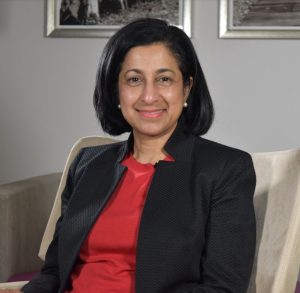Abdominoplasty with Miss Anita Hazari
Miss Anita Hazari, Consultant Plastic Surgeon at One Ashford Hospital explains more about Abdominoplasty, what the procedure involves and what you can expect before and after your surgery.
What is Abdominoplasty?
Abdominoplasty, also known as a tummy tuck, is a major surgical procedure wherein the excess skin and fat from the lower and middle abdomen is removed, and the muscles tightened.
Types of Abdominoplasty include:
Standard Abdominoplasty
This involves removing the excess skin and fat from the abdominal wall between the pubic area and the umbilicus (navel), leaving the umbilicus in place. The skin is then drawn down from the navel and sutured at the pubic level. In order to achieve this, the skin is usually elevated up to the level of the lower ribs. The patient will be left with a long, usually curved scar across the lower part of the abdominal wall at the level of the pubic hair, along with a scar around the navel. Liposuction may be carried out during this procedure for flanks, or as a separate procedure, either before or after the abdominoplasty in order to thin the abdominal wall.
Mini Abdominoplasty
A mini abdominoplasty involves removing the surplus skin below the navel, leaving a low abdominal scar at the level of the pubic hair. The navel is not disturbed, but liposuction may be carried out at the same time, in order to reduce the thickness of fat in the abdominal wall.
Extended Abdominoplasty
In addition to a standard abdominoplasty, surplus skin and fat of the loins and back is also removed so that the scar extends around the flanks and onto the lower back.
Fleur de Lys Abdominoplasty
Fleur de Lys abdominoplasty is reserved for patients who have undergone significant weight loss. A standard abdominoplasty will not address the horizontal skin excess. Therefore, in addition to a curved scar in the lower abdomen, the patient will also have a midline vertical scar; this may extend up to the ribs. The rectus muscles are brought together to repair any slackness in the muscle wall.
Liposuction
Liposuction is only used as an alternative procedure if it is felt that none of the above are suitable. Liposuction reduces fat and causes only a little retraction of the skin.
Who should have Abdominoplasty?
The best candidates for abdominoplasty are men and women who are in relatively good health, but are bothered by large fat deposits, or loose abdominal skin in the lower and/or middle abdomen. These fat deposits or loose skin often don’t not respond to diet and exercise. In women, this problem is often caused through pregnancy, but is greatly aggravated by weight loss.
Men are similarly affected by weight loss, and stretch marks are often left after extreme stretching of the skin. These are usually seen in the lower abdomen. There is no specific treatment for stretch marks, but many of them are removed in an abdominal reduction, and those that are left are tightened, making them look less obvious. Patients who are unable to tighten loose skin through exercise will benefit from this procedure.
Are there any risks involved?
All surgery and anaesthesia carries some uncertainty and risks. Below is a list of the most common or most significant problems that can occur following this type of surgery.
- Pain
- Blood transfusion
- Deep vein thrombosis
- Drains
- Haematoma
- Infection
- Scars
- Numbness
- Swelling
- Serona
- Revision surgery
Further information can be found here
Before and after surgery
An anaesthetist will visit you and examine you on the ward and explain the anaesthetic procedure. Miss Hazari will then see you and ask for your consent to proceed with your surgery. Pre-operative photographs are usually taken at the same time. She will mark the surgical plan on your abdomen prior to the surgery. Please ask questions on anything you are unsure about. It is important that you do not eat for a minimum of six hours and drink nothing for two hours before the surgery. This is for your own safety, in order to prevent any complications during your anaesthetic. The procedure takes roughly two to three hours.
You will be brought to the recovery area after your operation where you will wake up. The nursing staff are very experienced and will ensure your recovery is as pain free as possible. You will be given painkillers on a regular basis for as long as you need them. The operation does not usually cause much pain afterwards, although tightness and bruising may cause discomfort. Please inform the nurses if your pain persists.
What should I do when I get home?
You should be able to return to most of your normal activities within two to four weeks after your surgery, although this will vary from person to person. It is recommended that you increase strenuous tasks such as housework or gardening over a period of time. You may need to ask someone for help for the first couple of days, as it is important that you get plenty of rest during your recovery period.
Once you are at home from surgery, it is important to check your wounds. If your abdominal skin becomes red, swollen and painful, or if you are noticing a discharge, please contact the hospital immediately.
Returning to work
Depending on the type of work that you do, you may be able to return to work within two to three weeks. You will probably feel quite tired at first which is quite normal, so we suggest you talk to your employer about making a gradual return to your normal working hours. If your job involves heavy lifting, you may not be able to perform these tasks for at least six weeks.
Sporting activities
Many sports can be resumed about four weeks post-surgery. If the sport involves strenuous abdominal recruitment such as gym weights or crunches, it is advisable to gradually begin these activities roughly eight to ten weeks after surgery. You should also refrain from lifting heavy objects for at least six weeks after the surgery.
Follow-up appointments
On the day you go home following your surgery, an appointment will be booked for you to see Miss Hazari; this will usually be a week after surgery in order to check your dressings. A further appointment will then be made to make sure everything is settling down and you are healing well.
If you are considering undergoing abdominoplasty, or any other form of cosmetic surgery, you can book an appointment to see Miss Hazari to further discuss your options. Miss Hazari often holds free mini consultations, so keep an eye on our events page to check on availability. If you would like to go ahead and book a full consultation, please contact our Reservations team on 01233 423000 who will be happy to arrange an appointment for you. Alternatively, you can email us at ashford.info@onehealthcare.co.uk
Why choose One Ashford Hospital?
-
Recognised by all major private medical insurers
-
Competitive fixed-price packages available with 0% interest
- New purpose-built hospital
-
Fast access to consultations, diagnostics and treatment
-
Excellent patient feedback and satisfaction ratings





 One Ashford
One Ashford One Hatfield
One Hatfield